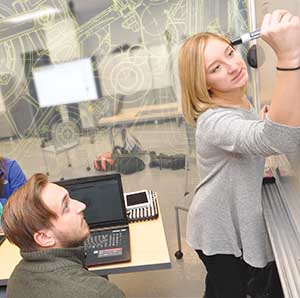Team project-based learning
The Polytechnic’s transformation incorporates team project-based learning to improve student ability to understand concepts and then to analyze, collaborate, design and create. Faculty introduce new concepts through the lens of a project rather than solely in descriptive terms. In other words, the project acts as the instructional vehicle through which students learn subject matter, and then the project is extended for students to apply their newly gained knowledge.
More than 70 percent of the Polytechnic’s courses now employ project-based learning. This intentional exposure to team dynamics, deadlines and problem-solving prepares graduates for success in the future.
Building a new way to learn
Soon after the announcement of the Polytechnic’s transformation, faculty in the School of Construction Management Technology (CMT) boldly worked together to dismantle and rebuild their curriculum in an innovative way. With all of their combined construction management experience, they determined that they could – and should – run their classes more like actual construction projects.
According to faculty, their own real-world experience provided excellent motivation for the change. In their careers, graduates may never spend one day on only one task. Skills and tasks are integrated throughout the workday; mimicking that environment in the college would better prepare students for a successful future.
You get a more well-rounded understanding of all of the subjects – much better than just learning the fundamentals. And, you get that experience of dealing with different people all the time.
- AUTUMN SHUMICKER
BS '18, construction management technology
CMT students now work their way through specific, real-world construction projects provided by industry partners. Students learn the required content in an integrated, project-based way, instead of learning the various project components in isolation. While the school used a few projects before the transformation, team project-based learning has become the foundational element of the program – what one faculty member referred to as “team project-based learning on steroids.”
This overhaul of the school’s curricula has created significant change for faculty, who work together to manage and teach project-based courses. Each course has two designated faculty ensuring all assignments and projects are cohesive with the rest of the curriculum. Faculty members still have independence and academic freedom, but everyone works together within the project-based framework.
With nearly 100 percent placement upon graduation, the Polytechnic’s School of Construction Management Technology is clearly preparing students for success while also serving as a model for how to employ project-based learning.
New design and innovation minor
Building on the transformational success of TECH 12000 - Design Thinking in Technology, one of the first core courses for Polytechnic majors - the Department of Technology Leadership and Innovation introduced a more advanced design-thinking plan of study, creating the design and innovation minor. TECH 34000 (Prototyping Technology for People) made its debut in fall 2018 as the third “stepping stone” of the design and innovation minor’s “continuous pathway.” During the course, students create tangible prototypes of problem-solving products, making adjustments along the way based on consumer feedback.
Department leaders expect the course addition to pay off for students – literally – as part of the inaugural Purdue Polytechnic Design & Innovation Challenge in December 2018. The design challenge, sponsored by the Dean’s Office and Autodesk Education, is open to students in TECH 12000 and TECH 34000. Student teams will submit their own intellectual property to vie for more than $10,000 in cash prizes and $1,000-per-student scholarships.
All indications point to the successful transformation of the Polytechnic.
With a focus on innovative learning methods, hands-on experiences and industry partnerships, these 10 Elements of Transformation drive the Polytechnic Institute’s dedication to impactful technology education.



